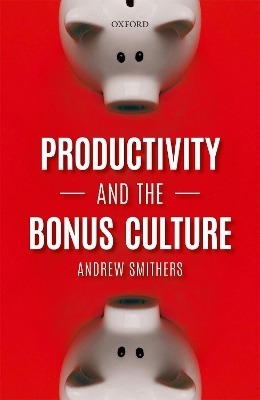
Productivity and the Bonus Culture
Oxford University Press (Verlag)
978-0-19-883611-7 (ISBN)
Living standards in the UK and US are in danger of falling. A decline in growth due to poor productivity and an unfavourable change in demography has weakened the stand of liberal democracy, and voter dissatisfaction is encouraging populist policies that threaten even worse outcomes. Whilst living standards once grew faster than productivity they now grow more slowly, and the working population is no longer growing faster than the population as a whole. To avoid falling living standards the productivity problem must be addressed.
Andrew Smithers argues that faster productivity does not depend, as many suggest, on technology; it also relies on investment. Current growth theory is based on a faulty model which has induced pessimism about our ability to encourage more growth. Productivity and the Bonus Culture sets out a revised model which demonstrates that weakness in productivity is the result of the bonus culture, and suggests ways to change this flawed system so that investment is encouraged and growth returns.
Andrew Smithers is the founder of economic consultancy Smithers & Co. He is the author of Valuing Wall Street: Protecting Wealth in Turbulent Markets, The Road to Recovery: How Economic Policy Must Change, and Wall Street Revalued: Imperfect Markets and Inept Central Bankers. He is a former columnist for the London Evening Standard, and has also written columns and blogs for The Times and the Financial Times.
1: The legacy of the financial crisis
2: What I seek to show
3: Poor productivity and damaging demography
4: The cause of poor productivity
5: Ageing populations
6: Other influences on growth
7: The problem of income inequality
8: Two models of growth
9: Investment and the stock of capital
10: Description of my model
11: The results of my model
12: Testing the proposed model
13: Investment, the capital stock, and economic policy
14: The bonus culture has raised the hurdle gate
15: The added impact of misinformation
16: Implications for growth
17: Management and shareholder interests
18: Distractions from serious debate
19: Deflation
20: The UK is similar to the US
21: Reversing perverse incentives
22: Changing the economic impact of current incentives
23: Misinformation adds to risks for the economy
24: The economic consequences of higher investment
25: Summary and conclusions
APPENDICES
A.1: The impact of real and nominal interest rates
A.2: Measurement of the net capital stock and depriciation in the UK and the US
A.3: The Gini Coefficient
A.4: The formulae for NTV
A.5: US profits as published are habitually overstated
A.6: The Balassa-Samuelson effect
A.7: Abolishing ACT caused a large rise in the effective rate of corporation tax
A.8: Why profit margins in mature economies are expected to revert to their mean
| Erscheinungsdatum | 10.07.2019 |
|---|---|
| Verlagsort | Oxford |
| Sprache | englisch |
| Maße | 158 x 240 mm |
| Gewicht | 438 g |
| Themenwelt | Wirtschaft ► Volkswirtschaftslehre ► Makroökonomie |
| Wirtschaft ► Volkswirtschaftslehre ► Mikroökonomie | |
| ISBN-10 | 0-19-883611-2 / 0198836112 |
| ISBN-13 | 978-0-19-883611-7 / 9780198836117 |
| Zustand | Neuware |
| Haben Sie eine Frage zum Produkt? |
aus dem Bereich


